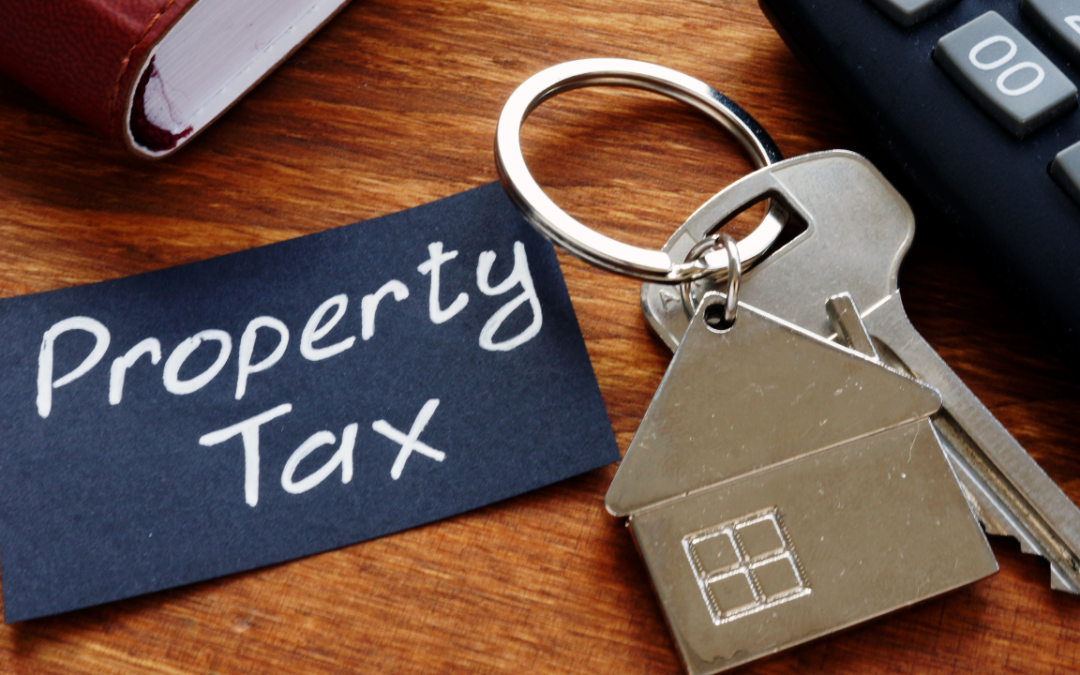Understanding property taxes in Colorado Springs, CO is an essential part of homeownership. Property taxes are a significant source of revenue for local governments, and they are used to fund various services such as schools, roads, and emergency services.
Property taxes in Colorado Springs, CO are based on the assessed value of the property, and they are calculated by multiplying the assessed value by the total tax rate. The total tax rate is the sum of all the tax rates of the various taxing authorities providing services in the tax area.
To understand how property taxes work in Colorado Springs, CO, it is crucial to know how the value of the property is determined. The value of the property is assessed by the El Paso County Assessor’s Office, which uses a variety of factors such as market value, location, and property type to determine the value of the property.
The assessed value of the property is then multiplied by the assessment rate, which is currently set at 7.15% for residential properties in Colorado.
Once the assessed value and assessment rate have been determined, the property tax can be calculated by multiplying the assessed value by the total tax rate.
The property tax payment process in Colorado Springs, CO is straightforward, and property owners can pay their taxes online, in person, or by mail. There are also tax relief and exemption programs available for eligible property owners who meet certain criteria.
Key Takeaways
- Property taxes in Colorado Springs, CO are based on the assessed value of the property and are used to fund local services such as schools, roads, and emergency services.
- The assessed value of the property is determined by the El Paso County Assessor’s Office using factors such as market value, location, and property type.
- Property owners in Colorado Springs, CO can pay their property taxes online, in person, or by mail, and there are tax relief and exemption programs available for eligible property owners.
Overview of Property Taxes in Colorado Springs, CO
Property taxes in Colorado Springs, CO are based on the actual value of the property and the tax rate set by the various taxing authorities in the area. The tax rate is often expressed as a mill levy, which is the amount of tax per $1,000 of assessed value.
The total tax rate is the sum of all the tax rates of the various taxing authorities providing services in the tax area. For example, the county tax rate, city tax rate, school district tax rate, and special district tax rate are added together to form the total tax rate.
The assessment rate for residential property in Colorado is currently set at 7.15% of the property’s actual value. This means that if a property is valued at $100,000, the assessed value would be $7,150.
The actual value of a property is determined by the county assessor’s office and is based on factors such as the property’s location, size, age, and condition.
The county assessor’s office also determines the taxable value of the property, which is the assessed value multiplied by the assessment rate.
Property taxes are due in two installments, with the first half due on February 28th and the second half due on June 15th. If the taxes are not paid by the due date, interest and penalties will be assessed.
Homeowners in Colorado Springs, CO may be eligible for certain property tax exemptions, such as the senior citizens exemption, the disabled veterans exemption, and the active duty military exemption. These exemptions can help reduce the amount of property taxes owed.
Overall, understanding property taxes in Colorado Springs, CO can be a complex process, but with the right knowledge and resources, homeowners can ensure they are paying the correct amount of taxes on their property.
Determining Property Value
Determining the value of a property is a crucial step in the property tax assessment process. In Colorado Springs, the actual value of taxable property is determined by the county assessor on the January 1 assessment date each year [1].
The actual value is defined as the value determined by appropriate consideration of the property’s market, cost, and income approaches [1].
Assessment Process
The assessment process involves three approaches to determine the actual value of a property: market, cost, and income. The market approach is used to determine the value of a property by comparing it to similar properties that have sold recently in the same area [1].
The cost approach is used to determine the value of a property by estimating the cost of replacing the property with a similar one [1]. The income approach is used to determine the value of a property by estimating the income that the property can generate [1].
After determining the actual value of a property, the county assessor calculates the assessed value. The assessed value is equal to the actual value multiplied by the assessment rate, which is currently set at 7.15% for residential properties in Colorado Springs [2].
Appealing Property Valuation
If a property owner believes that the assessed value of their property is incorrect, they have the right to appeal the valuation. The appeal process involves submitting a written protest to the county assessor’s office within 30 days of the date of the valuation notice [3].
The protest should include evidence that supports the property owner’s opinion of the property’s value. The county assessor will review the appeal and make a determination.
If the property owner is still not satisfied with the valuation, they can appeal to the county board of equalization or the state board of assessment appeals [3].
It is important for property owners to understand the assessment process and their rights to appeal the valuation. By doing so, they can ensure that their property is valued fairly and accurately.
Calculating Your Property Tax
Calculating property taxes in Colorado Springs, CO is a complex process that involves several factors.
The amount of property tax you owe is determined by multiplying your property’s assessed value by the total tax rate of the various taxing authorities providing services in your tax area.
Mill Levy Explained
The tax rate is often expressed as a mill levy, which is a percentage of the assessed value of your property. One mill is equal to one-tenth of one percent or 0.001. For example, if the total tax rate in Colorado Springs is 100 mills, then you would pay $100 for every $1,000 of assessed value.
Tax Rates and Calculations
To calculate your property tax, you need to know the assessed value of your property and the total tax rate in your area. The assessed value of your property is determined by the El Paso County Assessor’s Office, which is responsible for valuing all real property in the county.
Once you know the assessed value of your property, you can calculate your property tax by multiplying the assessed value by the total tax rate. For example, if the assessed value of your property is $200,000 and the total tax rate is 100 mills, then your property tax would be $20,000 ($200,000 x 0.1).
It’s important to note that the total tax rate in your area is made up of several different tax rates, including the county tax rate, school district tax rate, and city tax rate. Each of these rates is set by the respective taxing authority and can vary depending on the location of your property.
In conclusion, understanding how to calculate your property tax in Colorado Springs, CO requires knowledge of the mill levy, assessed value, and total tax rate. By knowing these factors, you can accurately determine how much you owe in property taxes each year.
Property Tax Payment Process
Payment Options
Property taxes in Colorado Springs can be paid through various methods. The most common payment options are:
- Online Payment: Property owners can pay their property taxes online by visiting the El Paso County Treasurer website. They can use their credit or debit cards to make the payment. However, a non-refundable fee of 2.39% of the tax amount is charged for credit card payments, and a flat fee of $3.95 is charged for debit card payments.
- Mail: Property owners can mail their property tax payment to the El Paso County Treasurer’s office at P.O. Box 2007, Colorado Springs, CO 80901-2007. Payments must be postmarked by the due date to avoid penalties.
- In-Person: Property owners can make their property tax payment in person at the El Paso County Treasurer’s office located at 1675 W. Garden of the Gods Road, Suite 2100, Colorado Springs, CO 80907. Payments can be made by cash, check, or money order.
Deadlines and Penalties
Property taxes in Colorado Springs are due on the last day of February each year. If the payment is not received by the due date, a penalty of 1% per month is added to the amount due. In addition to the penalty, interest is also charged at a rate of 1% per month.
Property owners who are unable to pay their property taxes in full by the due date can request a payment plan from the El Paso County Treasurer’s office. The payment plan allows property owners to make monthly payments towards their property tax bill. However, property owners must pay a down payment of at least 25% of the total amount due to qualify for the payment plan.
It is important for property owners to pay their property taxes on time to avoid penalties and interest. Property owners who have questions about their property tax bill or payment options can contact the El Paso County Treasurer’s office at (719) 520-7900.
Tax Relief and Exemption Programs
Colorado Springs offers tax relief and exemption programs to eligible residents. These programs are designed to provide financial assistance to those who need it most.
Senior Exemptions
Senior citizens who meet certain income requirements may be eligible for property tax exemptions.
The State of Colorado offers a property tax exemption to senior citizens and the surviving spouses of seniors who previously qualified. When the State of Colorado’s budget allows, 50 percent of the first $200,000 of actual value of a primary residence is exempted from property tax.
To apply for the exemption, you can contact the Colorado Division of Property Taxation at (303) 864-7777 or your county assessor.
Veteran Exemptions
Disabled veterans may also be eligible for property tax exemptions. The State of Colorado offers a property tax exemption to qualifying disabled veterans or their surviving spouses.
To be eligible, the veteran must have a 100 percent permanent disability rating from the Department of Veterans Affairs. The surviving spouse of a qualifying veteran may also be eligible for the exemption. To apply for the exemption, contact your county assessor.
Homestead Exemptions
In Colorado, a homestead exemption is available to homeowners who use their property as their primary residence. The exemption reduces the actual value of the property that is subject to property tax.
To be eligible for the exemption, the homeowner must have owned and occupied the property as their primary residence for at least two years. The exemption reduces the actual value of the property by 50 percent, up to a maximum of $200,000. To apply for the exemption, contact your county assessor.
Overall, these tax relief and exemption programs can provide significant financial assistance to eligible residents of Colorado Springs. If you think you may be eligible for any of these programs, be sure to contact the appropriate agency or your county assessor for more information.
Understanding Special Assessments
Special assessments are additional taxes on properties that benefit from specific public improvements, such as roads, sidewalks, or streetlights. These assessments are calculated based on the cost of the improvement and the property’s proximity to it. Unlike general property taxes, which are based on the value of the property, special assessments are based on the improvement’s cost.
Special assessments are typically levied by the local government, such as the city or county. Property owners are usually notified of the assessment and given the opportunity to protest it. If the assessment is not paid, the property may be subject to a lien or even foreclosure.
It is important to note that special assessments are separate from general property taxes and are not included in the tax bill. Property owners must pay special assessments separately, usually within a specific timeframe. Failure to pay the assessment can result in penalties and interest charges.
Overall, understanding special assessments is crucial for property owners in Colorado Springs, as they can add significant costs to property ownership. Property owners should carefully review their tax bills and seek professional advice if they have any questions or concerns about special assessments.
Property Tax and Local Services
Funding Allocation
Property taxes in Colorado Springs are used to fund a variety of local services such as schools, libraries, police and fire departments, and road maintenance. The tax rate is often expressed as a mill levy, which is the amount of tax per $1,000 of assessed property value. The total tax rate is the sum of all the tax rates of the various taxing authorities providing services in the tax area.
The Division of Property Taxation reports that in 2024, the total assessed value of all property in Colorado Springs was $100,000,000, and the revenue from property tax was $1,398,000. This translates to a tax rate of 0.013980 or 13.980 mills. The revenue generated from property taxes is distributed among the various local services based on their budgetary needs and priorities.
Community Impact
The funding allocation from property taxes has a significant impact on the community in Colorado Springs. For example, the revenue generated from property taxes is used to fund local schools, which in turn provide education and training to the future workforce of the city.
A well-funded police and fire department can help keep the community safe and secure, while road maintenance can help ensure that residents and visitors can travel safely and efficiently throughout the city.
Moreover, the revenue generated from property taxes is also used to fund local libraries, which provide access to books, resources, and educational programs for residents of all ages. Libraries can help promote literacy and lifelong learning, and they can also serve as community hubs for events and gatherings.
In conclusion, property taxes in Colorado Springs play a vital role in funding local services that are essential to the community’s well-being. By understanding how property taxes are allocated and distributed, residents can gain a better appreciation of the ways in which they contribute to the city’s growth and development.
Frequently Asked Questions
How are property taxes calculated in El Paso County, Colorado?
Property taxes in El Paso County, Colorado are calculated based on the assessed value of the property and the applicable tax rate.
The assessed value is determined by the El Paso County Assessor’s Office, which uses a variety of factors to determine the value of the property, including market trends, property characteristics, and other relevant data.
The tax rate is set by various taxing authorities, such as school districts, fire districts, and municipalities, and is based on the amount of revenue needed to fund their operations.
What factors influence the property tax rate in Colorado Springs?
Several factors influence the property tax rate in Colorado Springs, including the amount of revenue needed to fund local government operations, the assessed value of the property, and the tax rates set by various taxing authorities. Additionally, changes in state law or local regulations can also impact property tax rates.
Can you explain the property tax assessment process in Colorado?
The property tax assessment process in Colorado involves the El Paso County Assessor’s Office determining the value of each property in the county.
This is done by collecting data on the property, such as its location, size, and condition, and using that data to determine its market value. Once the market value has been determined, the assessed value is calculated by applying a percentage set by the state to the market value.
What recent changes have been made to property tax laws in Colorado?
As of 2024, there have been no recent changes to property tax laws in Colorado. However, property tax laws are subject to change, so it is important to stay informed about any updates or changes that may impact property taxes in Colorado.
How can I search for property tax information in Colorado Springs?
Property tax information for Colorado Springs can be found on the El Paso County Assessor’s Office website. The website allows users to search for property tax information by address or parcel number. Additionally, the website provides information on how to pay property taxes, important deadlines, and other relevant information.
What should I know about the 2024 property tax increase in Colorado?
As of 2024, there have been no announcements of a property tax increase in Colorado. However, property tax rates are subject to change based on various factors, including changes in state law, local regulations, and the need for revenue to fund government operations. It is important to stay informed about any updates or changes that may impact property taxes in Colorado.
Explore Colorado Springs
Top Day Trips from Colorado Springs
Colorado Springs is a vibrant city located at the eastern foot of the Rocky Mountains. Known for its stunning natural beauty, this city is a popular destination for outdoor enthusiasts and adventure seekers. However, there is more to Colorado Springs than just the...
Moving to Colorado Springs with Kids
Moving to a new city with kids can be a daunting experience. There are many factors to consider, such as finding a new home, enrolling in a new school, and making new friends. Colorado Springs is a popular destination for families who are looking to relocate. With its...
Pros and Cons of Living in Colorado Springs
Colorado Springs is a beautiful city located in the southern part of Colorado, nestled at the base of the Rocky Mountains. Known for its breathtaking natural scenery, outdoor recreation, and military presence, the city offers a unique lifestyle. However, like any...
Downsizing Tips for Your Move to Colorado Springs: Expert Advice
Key Takeaways: Downsizing can be challenging, but there are strategies that can make the process easier and more efficient. Understanding the Colorado Springs housing market is an important part of downsizing for your move. To ensure that you find a home that fits...
The Ultimate Guide to Colorado Springs Adventures
Dreaming of a destination that boasts both mesmerizing natural beauty and an energetic city atmosphere? Colorado Springs is the answer, cradled by the stunning Rocky Mountains. This guide unlocks the door to the best things to do in Colorado Springs, revealing...
Colorado Springs Best Neighborhoods
Colorado Springs! Breathtaking views, vibrant cultural scene, and that unbeatable Rocky Mountain backdrop, it's no wonder folks from all walks of life are flocking to this slice of paradise. With so many neighborhoods to choose from, how do you find the one that fits...
Moving to Peterson AFB Colorado Springs CO
Welcome to Your Exciting New Chapter at Peterson Air Force Base (AFB) in Colorado Springs, CO! This guide is designed not only for active-duty military personnel and their families but also for civilian contractors and those considering purchasing a home in this...
Top Challenges of Living in Colorado Springs, CO
As a local realtor who has had the privilege of calling Colorado Springs home for over a decade, I've witnessed firsthand the splendor and challenges this city presents. With the Rocky Mountains as our backdrop, Colorado Springs is not just a place to live; it's a...
Relocating to Colorado Springs, Colorado
Welcome to your ultimate guide on relocating to Colorado Springs, Colorado! Nestled at the foot of the majestic Rocky Mountains, Colorado Springs offers a blend of breathtaking scenery, vibrant culture, and thriving job opportunities. Whether you're moving for work,...
55+ Adult Community Homes for Sale in Colorado Springs CO
Your Guide to Finding the Perfect Home to retire in Colorado Springs 55+ adult community homes for sale in Colorado Springs, CO are becoming increasingly popular among retirees looking to downsize and enjoy a more relaxed lifestyle. These communities offer a range of...














